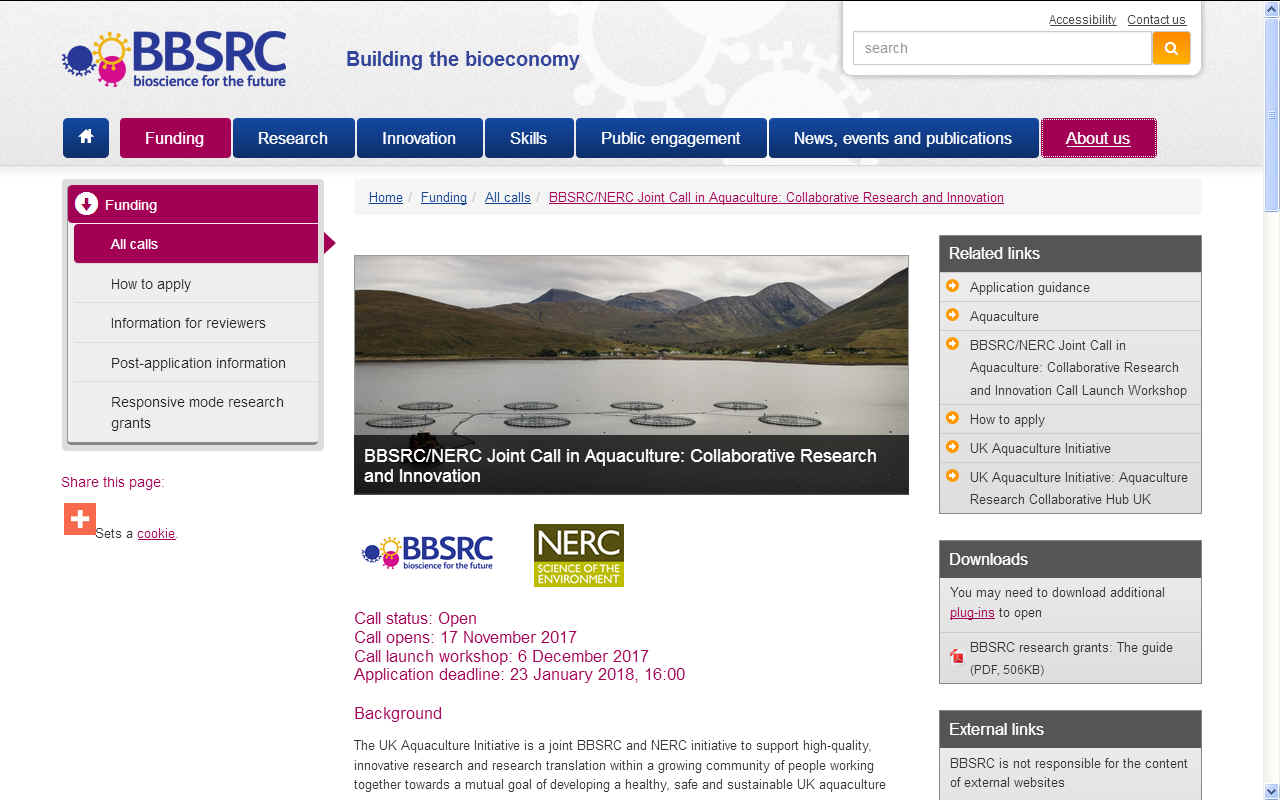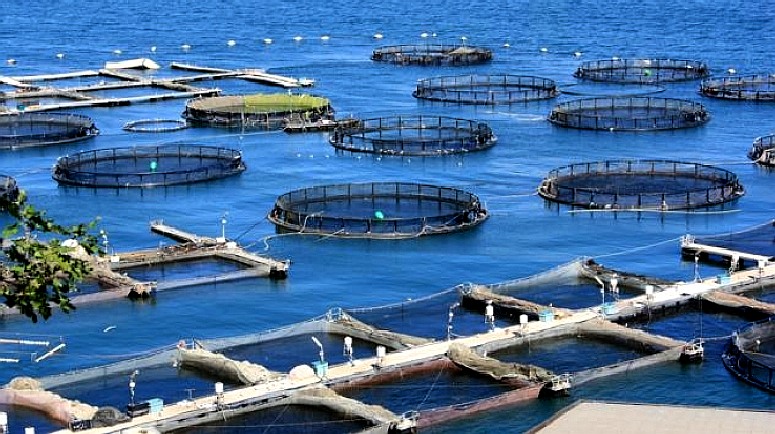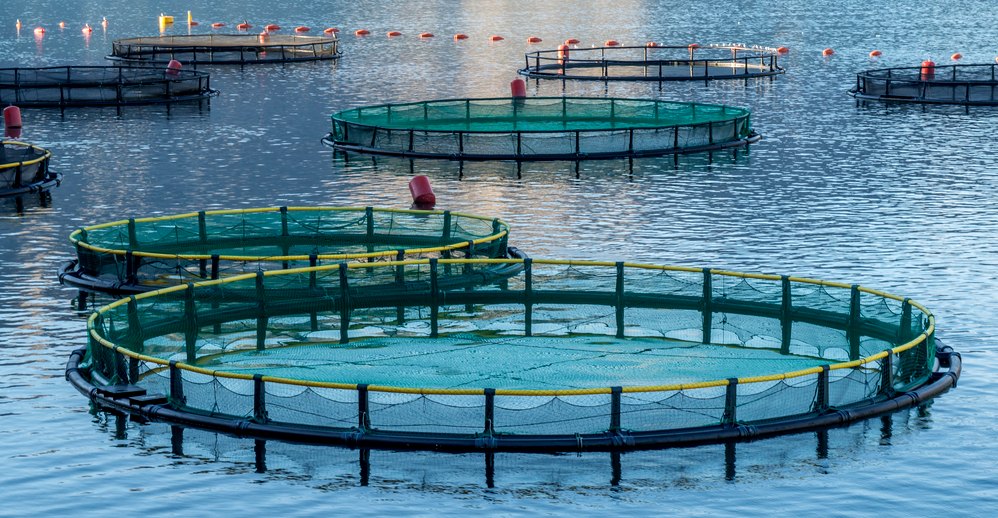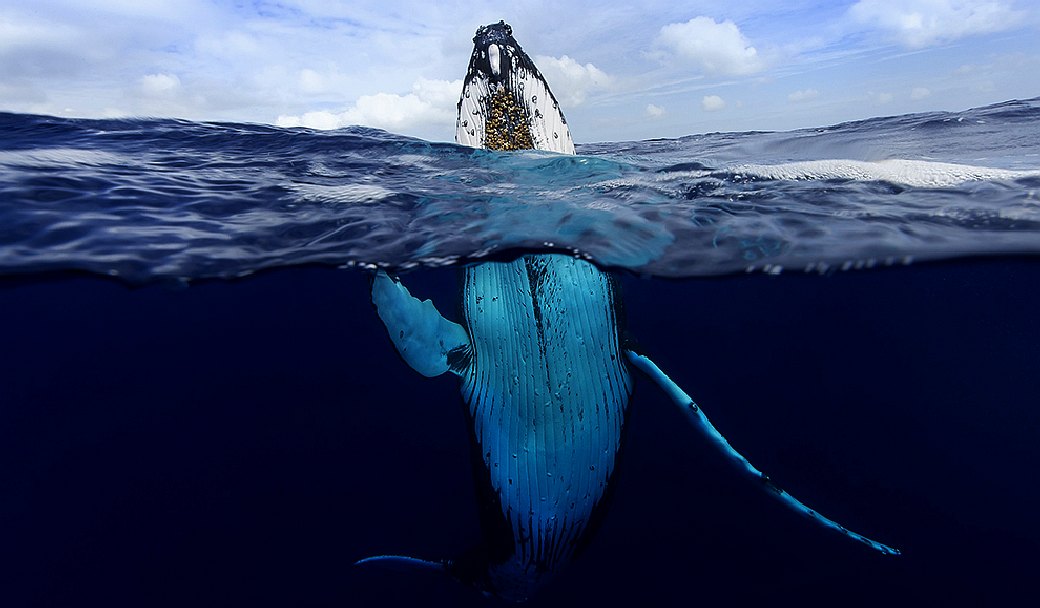|
BBRC/NERC
AQUACULTURE
ABOUT -
CONTACTS - FOUNDATION -
HOME - A-Z INDEX

COLLABORATIVE
RESEARCH CALL - Biotechnology and Biological Sciences Research Council (BBSRC) is a UK Research Council and NDPB and is the largest UK public funder of non-medical bioscience. It predominantly funds scientific research institutes and university research departments in the UK.
BBSRC's head office is at Polaris House in Swindon - the same building as the other Research Councils, AHRC EPSRC, ESRC, MRC, NERC, and STFC, as well as RCUK and the UKSA. Funded by Government, BBSRC invested over £509M in world-class bioscience in 2014-15. BBSRC also manages the joint Research Councils' Office in Brussels - the UK Research Office
(UKRO).
THIS
CALL OPENED: 17 November 2017
Call launch workshop: 6 December 2017
Application deadline: 23 January 2018, 16:00
BACKGROUND
With a two month window you will find that the recipients of
funding have by and large already been decided. Be aware of
that when considering making an application where you may have
little chance of success. The UK
Aquaculture Initiative is a joint BBSRC and NERC initiative to support high-quality, innovative research and research translation within a growing community of people working together towards a mutual goal of developing a healthy, safe and sustainable UK
aquaculture system.
Summary
BBSRC and NERC are please to announce a call for applications in aquaculture research. The purpose of this call is to support multidisciplinary research challenges in the aquaculture sector. All aquaculture research in the NERC/BBSRC remit will be eligible for this call, however a full call scope, outlining areas of particular strategic relevance, is published below.
A total of approximately £4.4 million is available for projects addressing key challenges in the aquaculture sector. Two types of funding will be available:
Funding for up to 3 large consortia grants, bringing together expertise from multiple disciplines to address challenges which cross the BBSRC/NERC remit.These grants will be funded for up to 3 years at a maximum of £1.2m. Funding for 7-10 smaller innovation grants addressing needs of the aquaculture industry. These grants will be funded for 12-24 months at a maximum of £200k.
In both cases involvement of a non-academic project partner is mandatory. New Investigators are particularly encouraged to apply for translation awards.
Applications to this call should be truly multidisciplinary, with integrated input from all co-investigators and project partners. As such BBSRC/NERC encourage all applicants to engage with project partners and potential end users from the very early planning stages of the project.
Launch workshop
In order to share information on the call and enable networking and consortia building BBSRC/NERC will hold a call launch workshop on 6 December 2017 at Fishmongers Hall in
London. For more information see: BBSRC/NERC Joint Call in
Aquaculture: Collaborative Research and Innovation Call Launch Workshop.
Registration for the workshop will be available on this site from 3 November 2017 and will close on 29 November 2017. All attendees will be expected to submit a short summary of their research interests and expertise in order to facilitate networking at, and after, the event. Places will be allocated on a first come first serve basis, however BBSRC/NERC reserve the right to manage the balance of attendees. HOW
TO APPLY
This call for proposals is now open on the Joint Electronic Submission (Je-S)
system. The call is open from the 17 November 2017 until 23 January 2018 and successful proposals will be announced in the summer of 2018 to start spend by October 2018. Applicants should read the full call text (below) before preparing their application and should use the template case for support documents provided. A document answering frequently asked questions is also included below. If you have any further queries about this initiative please contact us (see below). 5 December 2017 update:
The call text (see application downloads below) for BBSRC/NERC Joint Call in Aquaculture: Collaborative Research and Innovation has been updated to include funding of £120K from the Agri-Food Bioscience Institute to support the participation of their researchers as co-investigators in proposals led by an academic principal investigator (these proposals should be developed jointly between AFBI and academic colleagues as appropriate prior to submission).
The FAQs have been updated to include details on Cefas and AFBI contributions. Please note that the contribution from Cefas or AFBI to a project can be included in the 10% project partner contributions. All applicants to this call who plan to include Cefas or AFBI researchers in their proposals must discuss their projects with Cefas or AFBI prior to submission. The deadline for internal expressions of interest to Cefas is 15 December 2017.
BBSRC
ON AQUACULTURE In a more populous world, greater diversity of the use of the sea is both necessary and inevitable. The contribution of
fishing is diminishing and aquaculture is now the most rapidly expanding part of the livestock sector. In 2012 world aquaculture was predicted to exceed capture
fisheries as a food source for the first time. Globally over
one billion people depend on aquaculture as a primary source of dietary protein, which requires little energy input to produce and generates low levels of greenhouse gas emissions.
In the UK farmed fish and shellfish are a growing component of food supplies, and the government recommendation is for twice weekly consumption (particularly of oily fish) as part of a healthy and nutritious diet.
The farm gate value in the UK is growing and at over £600 million per year (mainly salmon, farmed in Scotland) now represents around one third of the scale of the cattle industry. The aquaculture industry is of interest to the UK government and devolved administrations, with recognised potential for economic growth not only in the UK but also exploiting UK science in global markets.
Successful and sustainable development of aquaculture, including the farming of new species, managing pests and diseases and meeting other challenges, requires strong underpinning fundamental bioscience. We have long been a funder of research related to aquaculture, although this has been on a smaller scale than research related to food production from other animals. Much of the research has been on diseases and pests relevant to the
salmon industry.
We recognise that research in aquaculture is an investment priority if we are to help deliver the strategic objectives of the Global
Food Security (GFS) programme. Issue four of the GFS Insight online publication is about the UK aquaculture industry.
BBSRC IN AQUACULTURE
We have a range of current and planned activities related to aquaculture, developed closely with NERC, other research funding organisations and the academic and industry communities, with the aim of supporting a vibrant UK research community across the range of BBSRC interests and delivering against a key GFS priority.
2015-2021 Working with industry: UK Aquaculture Initiative
BBSRC and NERC have reviewed the aquaculture sector's research needs to see what industry-academic collaborative tools or activities could support that need. In March 2015, BBSRC and NERC brought breeders, producers, processors, diagnostics and vaccine developers and retailers across the finfish and shellfish sectors together with a small number of academic experts to discuss industry priorities. The workshop report is available in the downloads section above.
BBSRC and NERC now run a joint UK Aquaculture Initiative which supports innovation projects and the Aquaculture Research Collaborative Hub UK (ARCH-UK). A new call for collaborative research and innovation projects will launch on 17 November 2017 for projects to start in October 2018.
2013-2015: Aquaculture Knowledge Exchange Fellow
In 2013, together with NERC and Sainsbury's, we funded an Aquaculture Knowledge Exchange Fellow. The KE Fellowship looked to generate impact from BBSRC- and NERC-funded research in aquaculture potentially making an important contribution to economic growth and quality of life.
Activities included:
* creating a database of expertise and contacts in UK aquaculture
* mapping BBSRC and NERC research against industry needs
reporting on industry research challenges in the aquatic food supply chain
* supporting the development of a BBSRC-NERC industry-academia collaborative initiative.
For more information email: karen.alexander@sams.ac.uk.

THE
SEA OF PLENTY - The Biotechnology and Biological Sciences Research Council (BBSRC) is a national funding agency investing in bioscience research and training in the UK. The Council aims to further scientific knowledge, promote economic growth and improve the quality of life in the UK and beyond.
BBSRC is an executive non-departmental public body, sponsored by the Department for Business, Energy & Industrial Strategy.
BBSRC
HISTORY
The BBSRC was created in 1994, merging the former Agricultural and Food Research Council (AFRC) and taking over the biological science activities of the former Science and Engineering Research Council (SERC).
Chairs
Sir Alistair Grant (1994-1998)
Dr Peter Doyle CBE (1998-2003)
Dr Peter Ringrose (2003-2009)
Prof Sir Tom Blundell FRS (2009–2015)
Prof Sir Gordon Duff (2015-present)
Chief Executives
Prof (now Sir) Tom Blundell FRS (1994 -1996)
Prof Ray Baker CBE (1996-2002)
Prof (now Dame) Julia Goodfellow CBE (2002-2007)
Prof Douglas Kell CBE (2008–2013)
Dr Jackie Hunter CBE (from 21 October 2013)
Prof Melanie Welham FRSB (2016-present)
Governance and management
BBSRC is managed by the BBSRC Council consisting of a chairman (from 1 July 2009, Professor Sir Tom Blundell), a chief executive (Professor Melanie Welham) and from ten to eighteen representatives from UK universities, government and industry. The Council approves policies, strategy, budgets and major funding. On 11 February 2016, the Minister for Universities and Science, Jo Johnson, announced the appointment of Professor Melanie Welham as interim Chief
Executive. Professor Welham was previously Executive Director of Science at BBSRC.
A Research Panel provides expert advice which BBSRC Council draws upon in making decisions. The purpose of the Research Panel is to advise on:
* the development and implementation of the Council's strategic plans
* the competitiveness, relevance, economic impact, and societal considerations of the science and *
innovation activities funded by BBSRC *
opportunities for partnership with national and international organisations

OPEN
WATER FISH TANKS - Today aquaculture is the fastest-growing food sector in the world. Most farmed seafood is currently produced in freshwater environments such as ponds, land-based tanks and
raceways
BBSRC
CONTACTS Rosie Peacock
Email: aquaculture@bbsrc.ac.uk
Tel: 01793 442197
Biotechnology and Biological Sciences Research Council (BBSRC)
Polaris House
North Star Avenue
Swindon SN2 1UH, UK
Tel: 01793 413200
Email: webmaster@bbsrc.ac.uk

LINKS
& REFERENCE
http://www.rcuk.ac.uk/funding/gcrf/
Babraham
Institute
Institute
of Food Research
Institute
of Biological, Environmental and Rural Sciences
John
Innes Centre
The
Pirbright Institute
Research
Councils UK
Roslin
Rothamsted
Research
Earlham
Institute, formerly The Genome Analysis Centre (TGAC)
UK
Research Office (UKRO)
Quadram
Institute
https://www.gov.uk/government/organisations/biotechnology-biological-sciences-research-council
https://en.wikipedia.org/wiki/Biotechnology_and_Biological_Sciences_Research_Council
http://www.bbsrc.ac.uk/funding/filter/uk-aquaculture-collaborative-projects/

This
website is provided on a free basis as a public information
service. Copyright © Cleaner
Oceans Foundation Ltd (COFL) (Company No: 4674774)
2018. Solar
Studios, BN271RF, United Kingdom.
COFL
is a charity without share capital.
|




